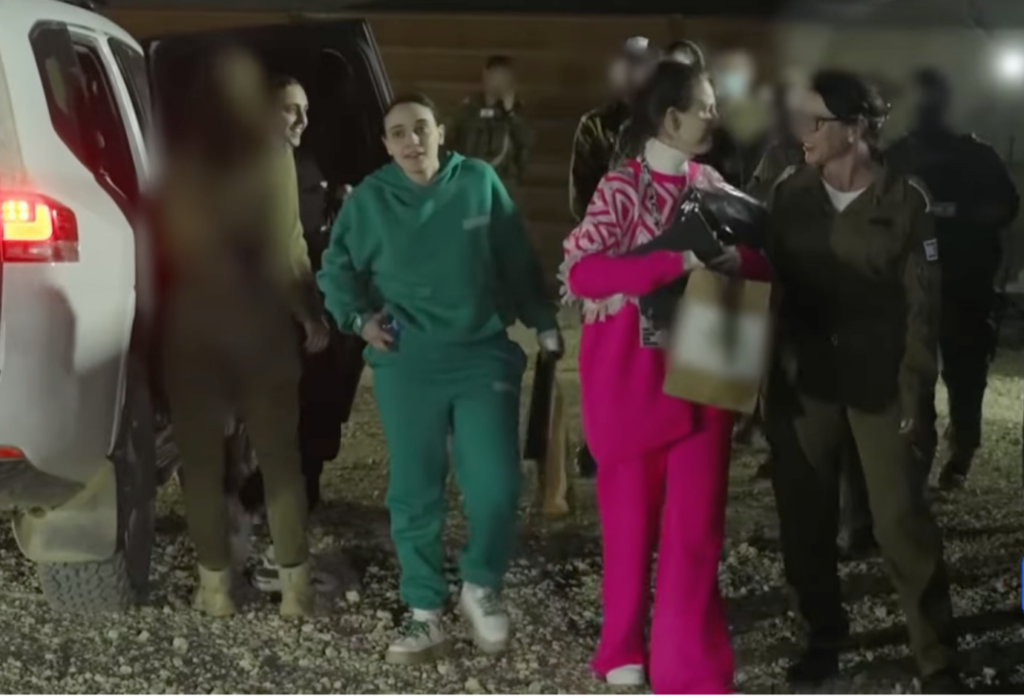Three Israeli female hostages who were captured during the October 7 Hamas-led attacks 15 months ago have been released from captivity in Gaza.
On Sunday, the three women — Emily Damari, 28, Romi Gonen, 24 and Doron Steinbrecher, 31, were released and reunited with their family. Photos released by AP show the women embracing their mothers near kibbutz Reim in southern Israel.
It came just hours after the long-awaited, second cease-fire agreement between Israel and Hamas went into effect, with Israel promising to release 90 Palestinian prisoners in exchange for the released hostages. However, hours after the three women’s release, there was no sign of any development in the first of the scheduled exchanges for the hostages captured in Gaza.
So far, the war has killed more than 46,000 Palestinians, including almost 18,000 children.
The release
Footage released by Al Jazeera showed live video of the three Israeli hostages being released as they walked between a row of cars while moving through Gaza City towards the Red Cross. They were surrounded by thousands of people as they were accompanied by armed men donned in green Hamas headbands.
According to Sheba Medical Center, the women were in a stable condition. Speaking briefly after they arrived safely in Israel, US President Joe Biden said, “They appear to be in good health.”
The women
Romi Gonen was abducted from the Nova music festival in southern Israel on 7 October 2023.
Before she was taken by Hamas, she was on the phone with her mother for several hours, relaying the horror of what she was witnessing. Details of their conversation emerged weeks after the abduction, as reported by AP, with Gonen’s mother saying her daughter thought she was going to die.
“Mommy, I was shot, the car was shot, everybody was shot. … I am wounded and bleeding. Mommy, I think I’m going to die,” Merav Leshem Gonen described.
She became one of the most outspoken activists attempting to bring the hostages back home, saying on the six-month anniversary of Hamas’ attack: “I know she is alive.”
“We are doing everything we can so the world will not forget,” she said. “Every day we wake up and take a big breath, deep breath, and continue walking, continue doing the things that will bring her back.”
Neighbours, Emily Damari and Doron Steinbrecher were both kidnapped from Kibbutz Kfar Aza in October 2023.
Doron Steinbrecher, a veterinary nurse who holds both Israeli and Romanian citizenship also called her mother when the attacks began.
Her brother told the media he heard his sister cry, “Mom, I’m scared. I’m hiding under the bed and I hear them trying to enter my apartment.”
Later, Steinbrecher sent a voice message to friends, telling them, “They’ve got me, they’ve got me, they’ve got me,” while she was being captured.
In early 2024, Steinbrecher was one of three young female hostages featured in a video released by Hamas that showed them appealing to the Israeli government for help to get them home.
The final hostage who was released on Sunday was British-Israeli citizen Emily Damari. Her mother Mandy described the torment she was enduring last January, saying, ““Emily is in a tunnel in the Gaza Strip 40 meters below ground level, imagine your daughter injured, perhaps being beaten, abused both psychologically and sexually, maybe even raped, definitely starving and with very little water or air. The released hostages are witnesses to all of these abuses.”
She added that she didn’t wish for people’s pity: “We are both fighters. That is why I came here today. We are both fighting for her life. I want you to join me in the fight for her life too.”
Celebrations in Tel Aviv
In the Israeli capital of Tel Aviv on Sunday, thousands of people gathered in the square to witness the latest news of the released hostages. Cheers erupted in front of the large screens as news trickled out of the three released hostages.
Israeli Prime Minister Benjamin Netanyahu described the return of the three women as “an incredibly moving day.”
“The whole nation is embracing you, welcome home,” he said. “I know, we all know, that they went through hell, they are going from darkness to light, they are truly exiting slavery for freedom. This moment was achieved through the sacrifice and bravery of our heroic fighters… this is a big moment, an emotional moment. A big day.”
What next?
The 42-day ceasefire deal should see Hamas release 33 Israeli hostages in exchange for the release of almost 2,000 Palestinian prisoners and detainees, with the next release of hostages expected to take place on Saturday.
Netanyahu has said that the ceasefire would be temporary and warned Israel would resume the war if necessary, adding that he has incoming president Donald Trump’s “full backing to Israel’s right to return to combat.”
In the Israeli-occupied West Bank and outside the Ofer prison on the outskirts of Jerusalem, family and friends of the 90 Palestinian prisoners (most of them women and minors) who were scheduled to be released are still waiting for their loved ones.
One of the detained prisoners includes a 15-year old teenager named Mahmoud Aliowat, who was among the dozens arrested and detained for apparent militancy or other national security offences.
In total, up to 2,000 Palestinian prisoners and Palestinians from Gaza who have been detained by Israeli forces are expected to be returned to their families. In the last few hours, the NYTimes has reported that no reasons have been given for the delay.
The UN under-secretary-general for humanitarian affairs Tom Fletcher told the Times that on Sunday, more than 630 trucks transporting humanitarian aid had entered Gaza.
“This is a moment of tremendous hope — fragile, yet vital,” he said. Overnight, charity group Save the Children released a statement, saying that almost all 1.1 million children in Gaza (roughly half the population) are currently in urgent need of food, with many surviving on just one meal a day.
“Many have been unable to get medical care with healthcare facilities destroyed, supplies exhausted given restrictions on their entry, and not one of Gaza’s 36 hospitals fully functioning,” the statement read. “Gaza’s six public community mental health centres and its one inpatient psychiatric hospital are also no longer functioning. Supplying water via trucks and installing latrines in shelters will also be critical to help stave off dehydration and stop any further spread of disease.”


